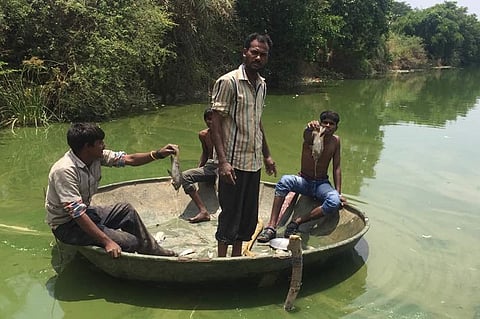

The gruesome sight and stench of hundreds of dead fish floating on Doddakallasandra lake on Monday morning shocked residents of a Bengaluru locality — an eerie resemblance to last year’s Ulsoor lake incident.
But residents of Konanakunte, Bengaluru had to wait over 24 hours surrounded by the rotting fish carcasses before authorities finally acted on their complaints and began cleaning the watery graveyard.
Residents say that the lake, divided by a sandbank, has two parts. In one part of the lake, untreated sewage water and construction waste is dumped rampantly. The other part, used for baths and domestic purposes, remains relatively clean.
Heavy rain on Monday resulted in the sandbank’s inundation and in the process, sewage and waste overflowed to the other half, residents said.
Officials of the Bruhat Bengaluru Mahanagara Palike said they have deployed pumps to clean the lake.
"It will take at least two weeks for the entire lake to be cleaned including filtering the water of the lake," Krishna, a BBMP worker told TNM. BBMP workers also used coracles to clear out the foul-smelling fish remains.
Regional media attention of the incident also spurred the area’s corporator, Shoba Gowda, to travel to the site and overlook Doddakallasandra lake’s cleaning process.
"What I think happened was that the water has been polluted by the nearby construction sites. They have dumped their dirty water in our lake. This is why the fishes died. The rain made it worse because the sewage has now mixed with the cleaner water," Dinesh, a resident, told The News Minute.
Although the lake’s deplorable condition is not new, residents said, they have never witnessed such a horrible scene.
Sayyed, a 70-year-old resident said, "The water was never that clean. It might have been earlier. This lake is used to rear fishes. It was not sparkling clean ever. It was less dirty but not totally clean but the fishes have not died before this time."
Despite multiple attempts, the corporation could not be reached for a comment.
When the Ulsoor lake incident occurred in March 2016, experts attributed the death of thousands of fish to the depletion of oxygen due to highly poisonous pollutants that settle on the bed of the lake. The lack of oxygen leaves the organisms “gasping for breath,” one expert said.
Ramprasad, convenor of Friends of Lakes, an NGO involved in rejuvenation of lakes in the city said, “There can be two reasons for the oxygen depletion in the lake which resulted in the fish kill. The incident must have occurred between 2am-5am in the morning when the oxygen concentration is lowest.”
He said, “Apart from the sewage and chemical effluents, some supplement used by the fishermen could have also resulted in the oxygen depletion in the water.”
Authorities in Bengaluru have been called apathetic to activists’ protests to protect the city's lakes.
Even the National Green Tribunal recently asked the state authorities to make all city lakes free of pollutants within a month.